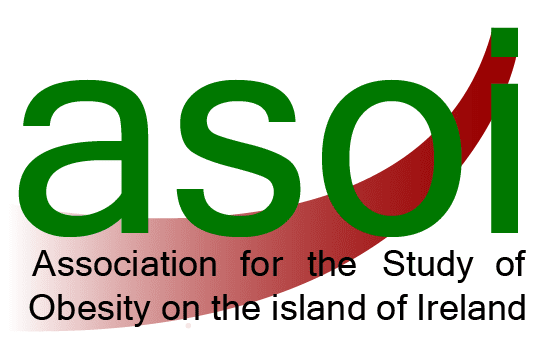IrSPEN (Irish Society for Clinical Nutrition & Metabolism), ASOI (Association for the Study of Obesity on the Island of Ireland) release new national data to highlight urgent need for national obesity treatment programme.
Dublin, 4th October 2017 – Ahead of World Obesity Day, 11th October, IrSPEN (Irish Society for Clinical Nutrition & Metabolism) and ASOI (Association for the Study of Obesity on the Island of Ireland) release new national data showing a 97% decrease in diabetes medication costs for people with obesity, complicated by difficult to control diabetes, who received obesity surgery in the last 12 months*. If current trends continue, by 2025, 33% of Irish adults will be obese and the annual cost of treating obesity-related diseases, like type 2 diabetes, will reach €2.1 billion – a 60% increase on the current spend. Furthermore, the cumulative cost of not treating obesity in Ireland between now and 2025 will be about €15.8 billion.
IrSPEN, ASOI, Safefood, Diabetes Ireland, the Royal College of Physicians of Ireland Policy Group on Obesity, the Irish Nutrition and Dietetic Institute (INDI) and the Irish Society for Chartered Physiotherapists (ISCP) are calling on government to allocate funding for the establishment of a national obesity treatment programme of evidence-based approaches, encompassing personalised dietary support, therapeutic exercise, weight loss medication, behavioural therapies and surgery. A national clinical obesity programme of this kind could reduce the burden of obesity-related diseases.
Obesity is already recognised as one of Ireland’s most serious public health challenges, affecting over one million people nationwide with an annual cost of €1.13 billion each year. Approximately one in 20 adults have an obesity-related disease such as type 2 diabetes, heart disease, liver disease, many types of cancer, sleep apnoea or subfertility which will improve if they can lose and sustain a 10% reduction in their body weight. Treatment of obesity is now relatively straightforward because of several evidence-based and effective treatments that work by combining dietary support, therapeutic exercise, behavioural therapy with medication and surgical procedures. Yet, treatments for obesity in general are severely under-resourced in Ireland at the two publicly funded adult regional obesity centres in Galway and Dublin, and the single childhood obesity centre in Dublin.
“Ireland has one of the lowest rates of obesity treatment in Europe, but one of the highest rates of obesity and difficult-to-control type 2 diabetes” says Prof. Carel le Roux, Diabetes Complications Research Centre, Conway Institute, UCD and IrSPEN board member. “It is estimated that a further 26,000 people have type 2 diabetes and receive insulin here and we need to address this with personalised treatment programmes – like dietary support, exercise, medication and surgery. The need to action is apparent and this new evidence confirms the HSE will recoup the cost of these surgeries within two years and will then go on to save millions on medication costs”.
“Obesity or bariatric surgery offers the most successful and cost effective option for the treatment of people with severe obesity and complications such as type 2 diabetes”, said Ms Helen Heneghan, Bariatric Surgeon, St Vincent’s Hospital & St. Columcille’s Hospital, Dublin. “I see a high percentage of patients return to normal blood sugar control, without the need for insulin or other medications, within two days of surgery – improving their quality of life and substantially reducing long term healthcare costs. We are facing an obesity crisis in Ireland and we need to invest in a national obesity treatment programme with dedicated resources as a matter of priority”.
“Obesity significantly increases the risk of developing serious conditions such as cancer, stroke, heart disease and osteoarthritis, as well as conditions impacting quality of life such as sleep apnoea”, says Dr. Grace O’Malley, StAR Research Lecturer in RCSI and ASOI board member. “Whilst efforts are being made in Ireland to implement population-wide preventive strategies to halt the rising prevalence of obesity, little is being done to provide treatment to those who already suffer the consequences of obesity. We urgently need a commitment from the Department of Health, the Department of Finance and the HSE to develop, implement and evaluate a national clinical programme for obesity that will provide suitable treatment for obesity to any child, adolescent or adult in need of such care. Healthcare professionals working tirelessly in primary, secondary and tertiary care settings urgently need support and resources in order to deliver such vital care”.
The World Obesity Federation data demonstrates how investing in the prevention, management and treatment of obesity is a cost-effective action for governments and health services. Investment can also help to achieve the 2025 targets set by the World Health Organization to halt the rise in obesity and to achieve a 25% relative reduction in mortality from non-communicable diseases. These Irish patient and professional groups and the World Obesity Federation are using World Obesity Day, 11th October, to urge governments, health service providers, insurers and philanthropic organisations to prioritise investment in tackling obesity. This means 1) investing in treatment services to support people affected by obesity, 2) early intervention to improve the success of treatment and 3) prevention to reduce the need for treatment.
World Obesity Day will take place on 11th October 2017. This year the focus is on investment in services that support the prevention, management and treatment of obesity.
The full IrSPEN call to action can be downloaded on www.irspen.ie.
Further details of how to support World Obesity Day and where to find more information on obesity, and obesity prevention and treatment, are available on the World Obesity Day website: https://www.obesityday.worldobesity.org/
Twitter: @worldobesity #WorldObesityDay
Thunderclap: https://www.thunderclap.it/projects/60935-world-obesity-day



